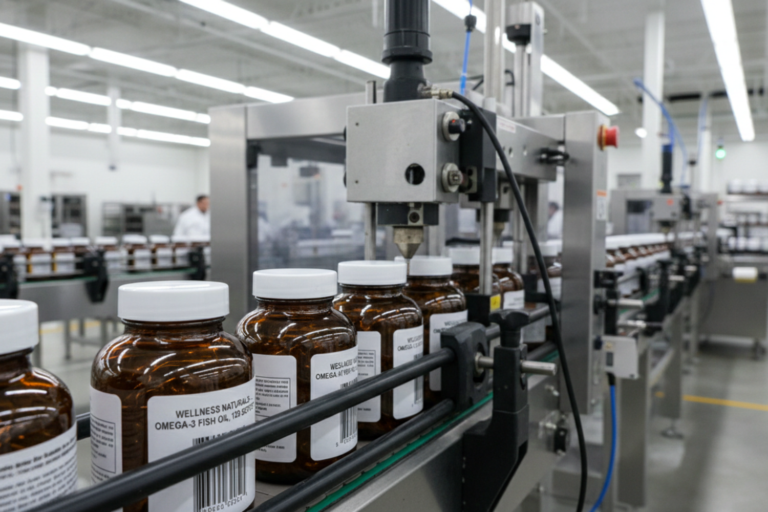Choosing the right supplement manufacturer is critical for any company entering or expanding in the dietary supplement industry. With a broad range of dietary supplement products on the market—including those that contain vitamins, amino acids, herbal medicines, and other substances—the ability to evaluate supplement manufacturers effectively can make or break a brand’s success.
This guide is designed for new supplement brands, growing businesses looking to scale, and companies that need to switch manufacturing partners. It will help you assess different manufacturers using a complete checklist grounded in regulatory requirements, product safety, quality control, and ingredient sourcing, so your finished dietary supplement product complies with FDA labeling and manufacturing regulations.
What Does Evaluating a Supplement Manufacturer Involve?
Evaluating supplement manufacturers is more than just comparing prices. It directly affects product quality, brand reputation, and compliance with food safety laws. Mistakes in this area can lead to serious adverse events, issues related to supplement safety, or even regulatory action from the Food and Drug Administration.
The evaluation process starts with research—learning about different manufacturers, reviewing their certifications, and understanding their capabilities. It ends with a clear decision based on data, safety information, and how well the manufacturer can meet your business goals in the supplement industry.
What Should You Look for in a Supplement Manufacturer?
Finding the right partner means ensuring their operations, standards, and services align with your brand’s needs. Here’s how to evaluate them step-by-step.
Do They Have the Right Certifications and Regulatory Compliance?
Dietary supplement manufacturers must follow strict rules to produce safe and legal dietary supplements. These rules come from the Food and Drug Administration and other regulatory agencies. Manufacturers should follow current good manufacturing practice (cGMP) guidelines to ensure every finished dietary supplement product is consistent and safe. Look for proof of compliance with U.S. and international safety standards.
Key certifications to check include:
- Current Good Manufacturing Practice (cGMP) certification
- FDA facility registration (required under federal law, but not a certification or endorsement)
- NSF International certification
- United States Pharmacopeia (USP) verification programs
- American Herbal Products Association (AHPA) membership
- Ensure the manufacturer complies with the Federal Food, Drug, and Cosmetic Act, which governs dietary supplement safety and labeling

How Transparent Are They About Ingredient Sourcing and Testing?
Knowing where dietary supplement ingredients come from is essential for product quality and supplement safety. A reliable manufacturer should clearly explain how they source dietary ingredients, including vitamins, herbal products, amino acids, and other botanicals. They should also conduct regular batch testing using validated analytical methods and provide Certificates of Analysis (COAs) for every batch. This helps support product quality and reduce the risk of safety issues.
Do They Offer the Manufacturing Capabilities You Need?
Supplement manufacturers should have the tools and equipment to handle the type of dietary supplement products your brand plans to sell. Different products require different processes; not every facility can produce every format.
Capabilities to look for:
- Capsules
- Powders
- Gummies
- Softgels
- Liquids
- Food supplements
- Herbal medicines
Choosing a manufacturer that aligns with your product type ensures smoother production and helps meet market demand.
What’s Their Track Record in the Industry?
A manufacturer’s history in the dietary supplement industry can tell a lot about its reliability. Look at how long they’ve been operating, what kinds of brands they’ve worked with, and whether they have case studies or testimonials. Experienced manufacturers are more likely to understand the unique challenges of your market niche and how to handle dietary substances with care. Their past performance is a strong indicator of future success.
Are Their Facilities Clean and Safe?
Clean, well-organized facilities help ensure product safety and quality standards are met. Supplement manufacturing involves handling sensitive materials like dietary supplement ingredients and herbal products. Facility tours—either virtual or in-person—can give you insight into cleanliness, safety procedures, and how well they follow standard operating procedures (SOPs) that reduce the risk of contamination or residual solvents in the food supply.
Do They Provide Labeling and Packaging Support?
Correct labeling is required under FDA regulations and the Dietary Supplement Health and Education Act. A good manufacturer should support labeling compliance to help your dietary supplements meet legal requirements. They should also offer packaging options that support your branding goals.
Look for services such as:
- Regulatory labeling assistance
- Custom packaging design
- Packaging formats that fit your product line
Are Lead Times, MOQs, and Flexibility Clear?
Knowing how fast a manufacturer can produce your supplements—and how much they require you to order—is important, especially for startups entering the supplement market. Some manufacturers have low minimum order quantities (MOQs) to support new brands, while others are better suited for large-scale operations. A clear timeline and flexible production options allow your business to grow without delays.
How Responsive and Supportive Is Their Team?
Strong communication can make your manufacturing process more efficient and less stressful. Look for manufacturers who offer dedicated account managers, respond quickly to questions, and are willing to provide onboarding support. A responsive team helps prevent problems and keeps your supply chain running smoothly. Fast, clear communication also reduces the chance of errors or delays in your finished dietary supplement product.
Mistakes to Avoid When Evaluating a Supplement Manufacturer
Making the wrong choice when evaluating supplement manufacturers can lead to delays, poor-quality dietary supplement products, or compliance problems. Avoiding common mistakes helps protect your brand’s reputation and ensures your supplements meet safety and quality standards.
Choosing Based Only on Price
Selecting a manufacturer based only on cost can result in low-quality dietary supplement ingredients, poor testing standards, or missed regulatory requirements. Focusing only on low-cost options may lead to quality control issues that could affect product safety.
Not Checking References or Reviews
References and reviews help you learn how different manufacturers treat clients and handle problems. Without this feedback, you could miss warning signs related to quality control, customer service, or recurring product safety issues.
Skipping Sample or Test Runs
Skipping sample runs increases the risk that the finished dietary supplement product won’t meet your expectations. Small test batches help identify issues early and allow for adjustments before committing to full production.
Failing to Understand Their Contract Terms
Not reading the contract carefully can lead to unexpected costs, inflexible lead times, or strict minimum order quantities. Always review terms around production schedules, payment policies, and responsibilities in case of serious adverse events or product recalls.
Questions to Ask a Supplement Manufacturer Before You Sign
Before signing with a supplement manufacturer, ask clear, direct questions to confirm their practices meet industry standards. This helps ensure product quality, safety evaluation procedures, and compliance with FDA regulations and the Dietary Supplement Health and Education Act.
Important questions include:
- Do you test every batch of supplements for quality and safety?
- Can I see your certifications, including cGMP and FDA registration?
- How do you handle product recalls, complaints, or adverse effects?
- What’s your process for scaling up production if demand grows?
- Can I receive a sample of my formula before full-scale manufacturing?
Extra Tips for a Smarter Evaluation Process
Improving how you evaluate dietary supplement manufacturers increases your chances of choosing a reliable partner. Use these tips to reduce risks and stay organized.
Start With a Trial Run or Small Batch
Starting with a small production run gives your business the chance to test product quality and the manufacturer’s reliability. It helps confirm that dietary supplements meet your expectations in terms of format, appearance, and labeling and gives you time to evaluate their operations without committing to large volumes. This is especially useful for startups entering the supplement market with limited budgets or specific product types.
Ask for Client References or Case Studies
Speaking with current or past clients gives insight into how the manufacturer handles deadlines, communicates, and responds to product quality issues. Case studies also reveal their experience with specific brands or supplement types, including those that include vitamins, herbal products, or amino acids.
Use a Manufacturer Evaluation Checklist
A checklist helps you track all the critical areas of your evaluation, from ingredient sourcing and testing to regulatory compliance and manufacturing capabilities. It ensures you don’t miss any key points during meetings, tours, or calls.
Your checklist should include:
- Certifications and regulatory compliance (cGMP, FDA, NSF)
- Types of supplement products they can manufacture
- Ingredient sourcing and batch testing policies
- Production lead times and MOQs
- Facility cleanliness and safety standards
- Labeling and packaging services
- Client references or testimonials
- Support and communication style
Choose a Supplement Manufacturer You Can Trust
Selecting the right supplement manufacturer requires careful research and a strong focus on quality standards, clear communication, and regulatory compliance. Taking the time to vet multiple supplement manufacturers helps protect your brand in the competitive dietary supplement industry.
From ingredient sourcing to finished dietary supplement product quality, each step should meet strict safety standards and follow FDA regulations. Use our free manufacturer evaluation checklist or contact us to simplify your search and make confident decisions for your supplement business.
Frequently Asked Questions
What certifications should a supplement manufacturer have?
Look for cGMP certification, FDA registration, NSF International approval, and United States Pharmacopeia (USP) verification to ensure compliance with safety and quality standards.
How do I evaluate the quality of a supplement manufacturer?
Review their testing procedures, verify ingredient sourcing, check for serious adverse events history, and confirm they follow good manufacturing practices.
What questions should I ask a potential supplement manufacturer?
Ask about batch testing, certifications, recall handling, production scaling, and sample availability to assess their reliability and compliance.
How do I know if a supplement manufacturer is reliable?
Check client reviews, industry track record, communication style, and consistency in meeting regulatory requirements and safety evaluation standards.
Can a supplement manufacturer help with labeling and packaging?
Yes, many supplement manufacturers offer support with regulatory labeling, custom packaging, and product labels to meet supplement market demands.
References
- U.S. Food & Drug Administration. (2024). Current Good Manufacturing Practices (CGMPs) for Food and Dietary Supplements. https://www.fda.gov/food/guidance-regulation-food-and-dietary-supplements/current-good-manufacturing-practices-cgmps-food-and-dietary-supplements
- U.S. Food & Drug Administration. (2024). Dietary Supplements. https://www.fda.gov/food/dietary-supplements
- U.S. Food & Drug Administration. (1994). Dietary Supplement Health and Education Act of 1994. https://ods.od.nih.gov/About/DSHEA_Wording.aspx
- U.S. Food & Drug Administration. (2005). Dietary Supplement Labeling Guide. https://www.fda.gov/food/dietary-supplements-guidance-documents-regulatory-information/dietary-supplement-labeling-guide
- U.S. Food & Drug Administration. (2022). FDA 101: Dietary Supplements. https://www.fda.gov/consumers/consumer-updates/fda-101-dietary-supplements
- U.S. Food & Drug Administration. (2025). How to Report a Problem with Dietary Supplements. https://www.fda.gov/food/dietary-supplements/how-report-problem-dietary-supplements
- U.S. Food & Drug Administration. (2025). Recalls, Market Withdrawals, & Safety Alerts. https://www.fda.gov/safety/recalls-market-withdrawals-safety-alerts



